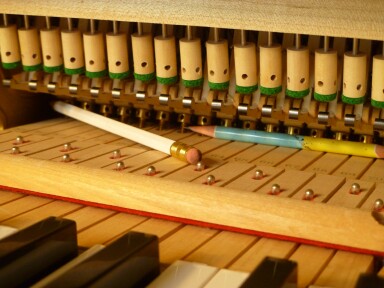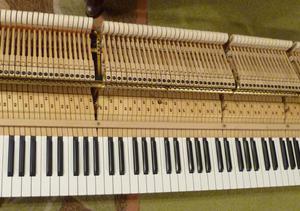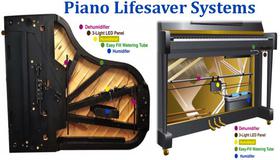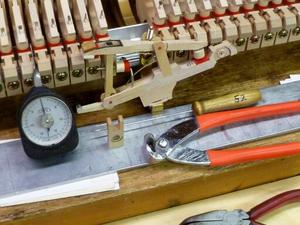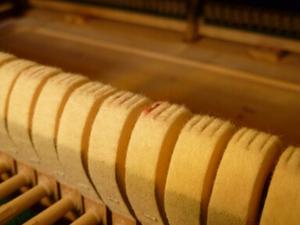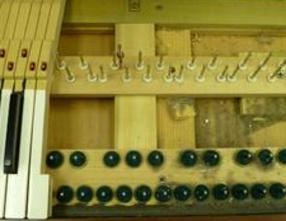Hallmark Piano Service
Call: 804-346-8068
Hallmark Piano Service • Henrico, VA 23294 • Call: 804-346-8068 • Copyright 2022 by Alan B. Hallmark, RPT
Frequently Asked Piano Questions
A thing of beauty that graces your home as an elegant piece of furniture–the piano is a complex musical instrument with over 7000 intricate parts made of various metals, wood , leather and felt. Some parts may be synthetic, others are produced from natural materials. The piano may have over 220 strings with a combined tension load of over 35,000 lbs. A typical small console piano can weigh in at around 350 lbs while a concert grand piano is well above 1000 lbs.
Many clients are concerned with the care and preservation of their new or inherited instrument. Over the years, many questions arise. Here are the answers to ten frequently asked questions.
There can be many reasons why a piano will go out of tune. Some reasons involve structural problems. The biggest reason though is that pianos are constructed with materials that are affected by the weather. It was once said that a good piano cannot be made without trees and sheep. The modern piano has incorporated many new innovations in synthetic materials that are impervious to environmental changes. However, wood and natural felt still make up a good portion of a piano's construction. The large area of the wooden soundboard expands and contracts against the strings when moisture in the air fluctuates. With this movement, the piano strings' tension will change, causing pitch deviation. The "Piano Life Saver" can help to stabilize piano pitch.
New pianos should be tuned at least four times in the first year due to settling and string stretch. One or more of these tunings may have taken place in the dealer's showroom. Performance pianos will need to be tuned before each concert and sometimes between rehearsals. Average home use may require two tunings per year. To maintain the correct tension on the piano soundboard, a piano should be tuned at least once a year whether it is used or not. The "Piano Life Saver" can reduce the tuning cycle.
2. How often should I tune my piano?
3. No one plays the piano. What will happen if it is not serviced?
Over time, soundboard movement and string stretch will occur. Overall pitch generally lowers, causing a tension imbalance in stresses on the soundboard. The pianos' out of tune sound can discourage a student from practicing and hinder their ear training. More important to the parent is that additional work at additional cost may be required to restore the piano's pitch and playability. The "Piano Life Saver" can help to preserve piano longevity.
4. Is there a best time of year to tune our piano?
Constant fluctuation of humidity in your home throughout seasonal changes can make it hard to pick a best time of year. It takes as little as a 10% change in humidity to affect your pianos' tuning and action function. Without humidity control, my suggestion is to tune and service the piano before any special reoccuring event, holidays or piano recitals. This will have the piano sounding it's best during these times. With the "Piano Life Saver" installed, choose the most convenient times of the year and stick to a regular schedule.
5. What is the best placement of my piano?
A piano can be the showpiece of your home's interior decoration. Placement should be such that the piano's keyboard serves as an invitation to play. For service access to the piano's action, leave at least 3' of open space in front of the keyboard. Air currents in your home can affect your piano's stability. If possible, keep it away from cold air returns, heating registers, windows, fire places and direct sunlight. In the Richmond area, I find that pianos located in rooms away from the sun's southern exposure are more stable. A grand piano equipped with a stringcover, an underside cover and the "Piano Life Saver" will be better protected in situations of extreme environmental conditions.
6. Who should move my piano and will it go out of tune?
Carefully moving the piano will not effect the tuning. However, moving the piano into an environment with different humidity and/or temperature levels will. When moving to a new location it is best to let the piano acclimate a few weeks before retuning.
I highly recommend a professional piano mover when relocating the piano. Attempting to move the piano without proper equipment and knowledge can result in serious injury to you or damage to your piano. A piano equipped with the "Piano Life Saver" does need special moving preparation – please contact us for a moving specialist who is familiar with the system.
7. Should I or my house keeping service clean the piano?
I find that it is best to let a professional piano technician clean the interior and polish the case, the exception being that you receive specialized instructions on how and what to do. Some brand name cleaners and polish may be harmful to the piano's working parts and/or finish. I carry "Cory Keyboard Products" which were developed with piano care in mind.
8. What other maintenance will my piano need?
Maintenance needs can vary depending on the piano's brand, model, size and age, as well as the pianist's proficiency, the venue, personal preference, and the environment. Besides regular tuning, your new piano will eventually need cleaning, regulation, voicing, pedal adjustment, and the occasional repair.
9. Who should service the piano?
A registered piano technician of the Piano Technicians Guild has received his titled certification by passing a series of rigid tests in piano tuning, repairs and general piano knowledge. The Piano Technicians Guild is a non-profit organization of skilled craftsmen who constantly upgrade their knowledge and skills through local, regional and international seminars and classes. A full-time registered piano technician can help to meet your service needs, including "The Piano Lifesaver".
10. Ok, I give up. What is The "Piano Life Saver"?
I'm glad that you asked. The Dampp-Chaser "Piano Life Saver" is a climate control system for the inside of your piano. It creates a micro-environment within the upright piano cabinet and underneath the soundboard of the grand piano. It has both a humidifer and dehumidifier which automatically alternates to keep a humidity level of 45% through seasonal changes. A consistant humidity level within the piano helps to stabilize the wooden and felt parts which results in longer lasting tunings and a prolonged useful life.
The Dampp-Chaser Piano Life Saver System is endorsed by piano manufacturers world wide. Contact me to find out which installation is best for your piano or schedule an appointment now to have the Piano Life Saver System installed on your piano.
Dust under the keys attracts mold and vermin.
Hammer felt string cuts adversely affect tone.
Objects in the action – a source of sticking keys.
1. Why does my piano go out of tune?
Repinning flanges to correct action sluggishness.



